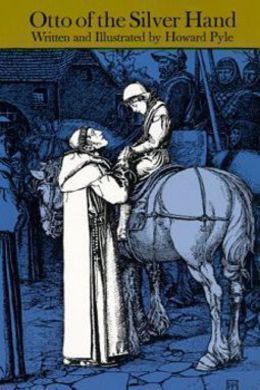
-
EPUB 141 KB
-
Kindle 170 KB
-
Support epubBooks by making a small $2.99 PayPal donation purchase.
Description
Born into a family that is already engaged in a blood feud with another noble house, Otto is sent to live with monks, but is reclaimed at age 12 by his militant, but loving father. The gentle-natured boy is kidnapped and mutilated by the rival family. Pauline, his captors daughter helps him escape. His father allows him to return to the monks who place him under the emperor’s protection. His silver hand is a replacement for the one Otto lost while in captivity, but his injury does not prevent him from maturing wisely and marrying Pauline.
110 pages with a reading time of ~1.75 hours (27511 words), and first published in 1888. This DRM-Free edition published by epubBooks, 2009.
Community Reviews
There are currently no other reviews for this book.
Excerpt
Up from the gray rocks, rising sheer and bold and bare, stood the walls and towers of Castle Drachenhausen. A great gate-way, with a heavy iron-pointed portcullis hanging suspended in the dim arch above, yawned blackly upon the bascule or falling drawbridge that spanned a chasm between the blank stone walls and the roadway that winding down the steep rocky slope to the little valley just beneath. There in the lap of the hills around stood the wretched straw-thatched huts of the peasants belonging to the castle–miserable serfs who, half timid, half fierce, tilled their poor patches of ground, wrenching from the hard soil barely enough to keep body and soul together. Among those vile hovels played the little children like foxes about their dens, their wild, fierce eyes peering out from under a mat of tangled yellow hair.
Beyond these squalid huts lay the rushing, foaming river, spanned by a high, rude, stone bridge where the road from the castle crossed it, and beyond the river stretched the great, black forest, within whose gloomy depths the savage wild beasts made their lair, and where in winter time the howling wolves coursed their flying prey across the moonlit snow and under the net-work of the black shadows from the naked boughs above.
The watchman in the cold, windy bartizan or watch-tower that clung to the gray walls above the castle gateway, looked from his narrow window, where the wind piped and hummed, across the tree-tops that rolled in endless billows of green, over hill and over valley to the blue and distant slope of the Keiserberg, where, on the mountain side, glimmered far away the walls of Castle Trutz-Drachen.
Within the massive stone walls through which the gaping gateway led, three great cheerless brick buildings, so forbidding that even the yellow sunlight could not light them into brightness, looked down, with row upon row of windows, upon three sides of the bleak, stone courtyard. Back of and above them clustered a jumble of other buildings, tower and turret, one high-peaked roof overtopping another.
The great house in the centre was the Baron’s Hall, the part to the left was called the Roderhausen; between the two stood a huge square pile, rising dizzily up into the clear air high above the rest–the great Melchior Tower.
At the top clustered a jumble of buildings hanging high aloft in the windy space a crooked wooden belfry, a tall, narrow watch-tower, and a rude wooden house that clung partly to the roof of the great tower and partly to the walls.
From the chimney of this crazy hut a thin thread of smoke would now and then rise into the air, for there were folk living far up in that empty, airy desert, and oftentimes wild, uncouth little children were seen playing on the edge of the dizzy height, or sitting with their bare legs hanging down over the sheer depths, as they gazed below at what was going on in the court-yard. There they sat, just as little children in the town might sit upon their father’s door-step; and as the sparrows might fly around the feet of the little town children, so the circling flocks of rooks and daws flew around the feet of these air-born creatures.
It was Schwartz Carl and his wife and little ones who lived far up there in the Melchior Tower, for it overlooked the top of the hill behind the castle and so down into the valley upon the further side. There, day after day, Schwartz Carl kept watch upon the gray road that ran like a ribbon through the valley, from the rich town of Gruenstaldt to the rich town of Staffenburgen, where passed merchant caravans from the one to the other–for the lord of Drachenhausen was a robber baron.
Dong! Dong! The great alarm bell would suddenly ring out from the belfry high up upon the Melchior Tower. Dong! Dong! Till the rooks and daws whirled clamoring and screaming. Dong! Dong! Till the fierce wolf-hounds in the rocky kennels behind the castle stables howled dismally in answer. Dong! Dong!–Dong! Dong!
Then would follow a great noise and uproar and hurry in the castle court-yard below; men shouting and calling to one another, the ringing of armor, and the clatter of horses’ hoofs upon the hard stone. With the creaking and groaning of the windlass the iron-pointed portcullis would be slowly raised, and with a clank and rattle and clash of iron chains the drawbridge would fall crashing. Then over it would thunder horse and man, clattering away down the winding, stony pathway, until the great forest would swallow them, and they would be gone.
Then for a while peace would fall upon the castle courtyard, the cock would crow, the cook would scold a lazy maid, and Gretchen, leaning out of a window, would sing a snatch of a song, just as though it were a peaceful farm-house, instead of a den of robbers.
